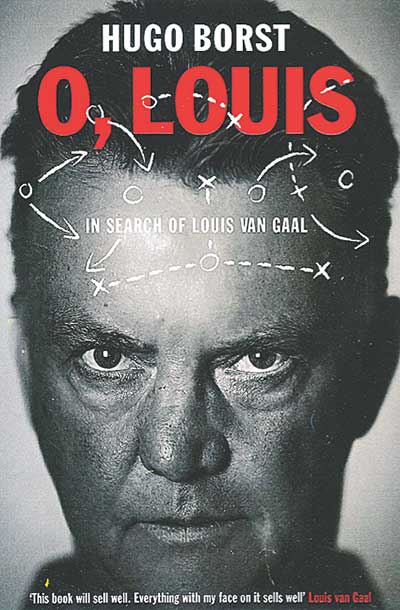 In search of
Louis van Gaal
In search of
Louis van Gaal
by Hugo Borst
Yellow Jersey Press, £9.99
Reviewed by Jonathan O’Brien
From WSC 337 March 2015
Hugo Borst was supposed to analyse the 2014 World Cup for viewers of Dutch television. Instead, however, he spent the tournament lazing around on a sofa in the NOS studios, petting his dog and quaffing bottles of red wine, while saying hardly anything in the entire month. Not so much punditry as performance art – and a penny for the thoughts of whoever signs NOS’s cheques.
Borst and Louis van Gaal used to be close friends – the way Borst tells it, anyway – but fell out when Van Gaal accused Borst of giving his mobile phone number to another journalist. Borst’s long-standing obsession with his former pal has now reached its deranged apotheosis in this ludicrous but strangely compelling book, which has been translated from the original Dutch in the wake of Van Gaal’s move to Manchester United. Determined to saw his way through the layers of obstinacy and arrogance in order to unearth the “real” Van Gaal, he decides to analyse his hero/nemesis through the prism of psychology – and to get other people to do it.
So Borst ropes in a succession of Dutch experts in their own fields to make sense of the managerial martinet. If you’ve ever wanted to know what a stand-up comedian makes of Van Gaal (“He goes against the grain of the times we’re living in”), or how a politician regards him (“There are signs that he’s mellowing”), fill your boots. Luckily, some of the contributions are more illuminating. A priest, pondering Van Gaal’s publicly stated renunciation of God and all religion after his wife died of cancer, muses: “It’s understandable, of course. Who else are you going to hold responsible? It’s a mystery. The mystery of suffering. Where does it come from, and why? And why am I the one to suffer?” The cleric concludes that Van Gaal finds salvation in “unrelenting hard work [and] achieving results”.
There are times when Borst wanders onto somewhat dubious ground. Hiring a psychiatrist to analyse a third party who they’ve never even met is fatuous at best, and deeply crass at worst. The bit where he rings up Ronald de Boer to ask if Van Gaal uses Botox makes you feel embarrassed for him. And was it really necessary to pick over the contents of a long-ago phone conversation between Van Gaal and the doomed Robert Enke, when the latter was about to sign for Barcelona?
Borst just about gets away with all this because his way with words is undeniably very entertaining (either that or the translator did an extraordinary job with the raw material). His authorial voice, gently sarky and sardonic without ever quite overdoing it, puts you in mind of another Dutch writer, Herman Koch, whose deceptively serene tales of middle-class viciousness have found a wide audience both in the Netherlands and outside it. Sure enough, it comes as little surprise when Koch himself turns up on page 100, musing on how Van Gaal reminds him of one of his old teachers at school. A weird book, but despite its numerous lapses of good taste a fun one.